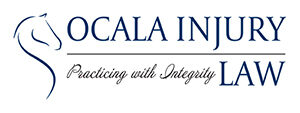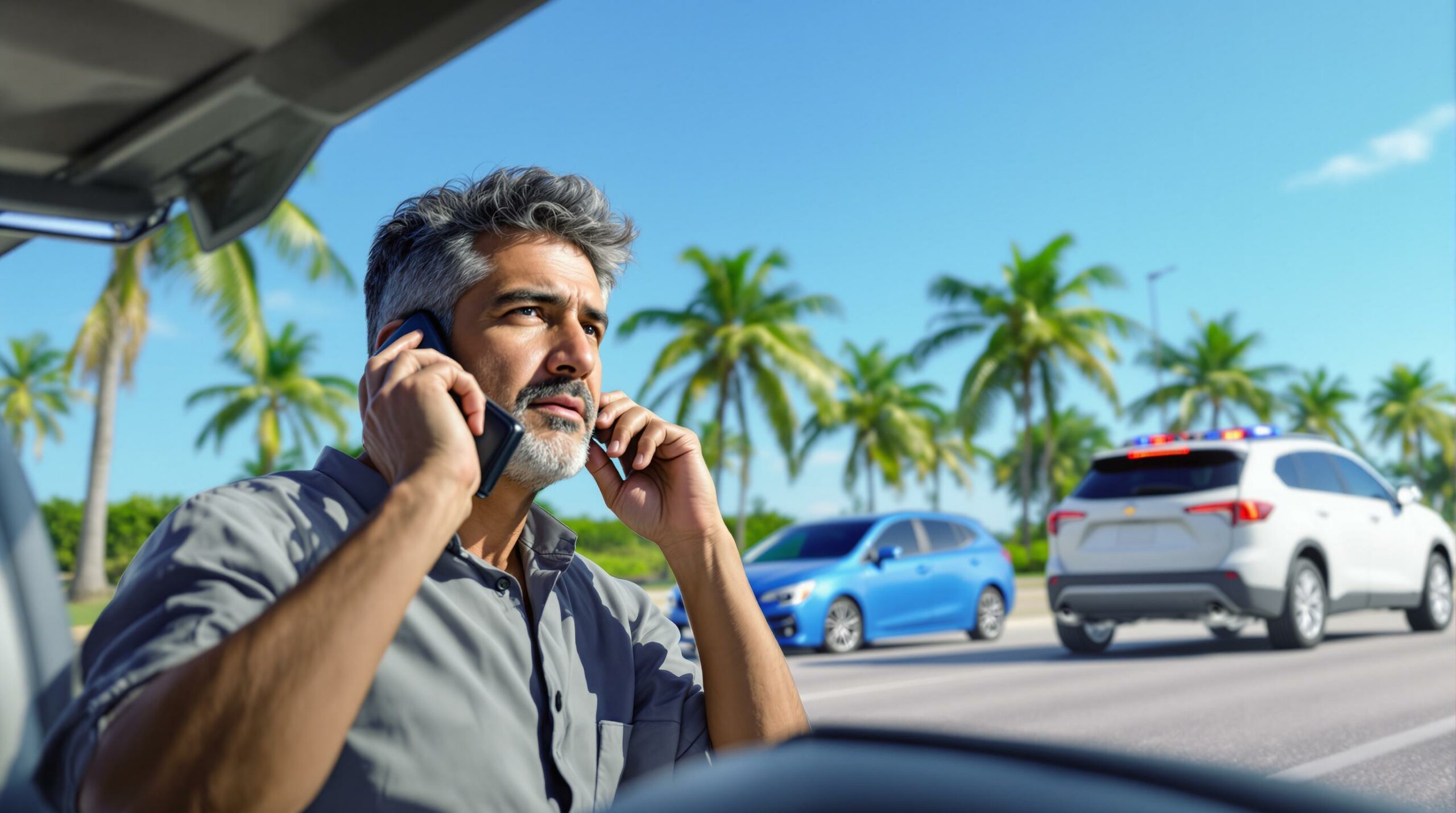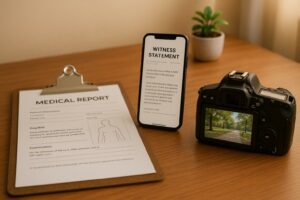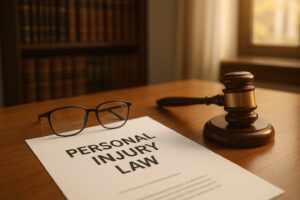Car accidents can be overwhelming, but knowing what to do can protect your safety, health, and legal rights. Here’s a quick overview of the 7 steps to take immediately after a car accident in Florida:
- Stay Safe: Move to a safe spot, turn on hazard lights, and check for injuries.
- Call the Police: Report accidents involving injuries, fatalities, or damages over $500.
- Document the Scene: Take photos, gather driver details, and talk to witnesses.
- Get Medical Care: Seek treatment within 14 days to qualify for PIP insurance benefits.
- Notify Your Insurance: Report the accident promptly to start the claims process.
- Consult a Lawyer: Protect your rights and get help navigating insurance and legal steps.
- Keep Records: Save all medical, insurance, and accident-related documents.
Quick Tip: In Florida, you must carry $10,000 in Personal Injury Protection (PIP) and $10,000 in property damage liability coverage. Acting quickly and following these steps ensures compliance with state laws and maximizes your protection.
Step 1: Stay Safe at the Accident Scene
What you do right after a car accident can make a big difference in preventing more harm.
Get to a Safe Spot
If your car can still be driven and you’re in a dangerous area, like a busy highway, move it to the shoulder or another safe location. Turn on your hazard lights to make your vehicle more visible.
If moving the car isn’t safe, stay inside with your seatbelt on and keep the hazard lights flashing until help arrives. If you have emergency warning tools like cones, flares, or triangles, set them up to alert other drivers.
Check for Injuries
Once you’re in a safe location, check for injuries – both yours and others’.
- Start by assessing yourself to avoid worsening any potential injuries.
- Check passengers and other drivers for visible injuries, such as bleeding, difficulty moving, or signs of confusion or pain.
Keep in mind that shock can hide injuries. If anyone appears hurt, call 911 right away. Avoid moving someone who seems seriously injured unless they’re in immediate danger, as improper movement could make things worse. While waiting for emergency responders, focus on keeping injured individuals calm and still.
Even if you feel fine, keep an eye on your condition. Some injuries, like whiplash or internal damage, might not show up immediately.
Step 2: Call the Police
Once everyone is safe, it’s time to notify the authorities. In Florida, you must report accidents that involve injuries, fatalities, or property damage of $500 or more.
When to Call 911 vs. Non-Emergency
Here’s how to decide whether to call 911 or use a non-emergency number:
Call 911 if:
- Someone is hurt or in immediate danger
- Traffic is blocked
- A driver seems impaired
- The vehicles have major damage
- There are other safety risks, like debris or hazards
Use a non-emergency number if:
- No one is injured
- Cars can be moved without issue
- Damage is minor
- All drivers are present and cooperative
What to Tell Police Dispatch
When speaking with dispatch, provide clear and accurate information:
- Location: Share your exact location, including nearby landmarks.
- Details: Mention the number of vehicles involved, any injuries, vehicle positions, and hazards like leaking fuel.
- Towing: Let them know if towing services are needed.
Make sure to note the responding officer’s name, badge number, and agency. You’ll need this information to request the official crash report, which is crucial for both insurance claims and legal matters.
"A ‘Florida Traffic Crash Report’ is mandatory where a crash between a bicyclist and a motorist involves bodily injury to any party, death, or damage to any vehicle, bicycle or other property of at least $500." – Chris Burns, Attorney
If no officer comes to the scene, file a report at the nearest police station as soon as possible. Also, gather key details from the other driver while you’re there.
Step 3: Document the Accident
After addressing safety concerns and notifying the necessary parties, your next step is to document the accident. This is crucial for gathering evidence that may be needed for insurance claims or legal matters.
Take Photos of the Scene
Start by taking clear photos of all vehicles and the surrounding area:
- Vehicle Damage: Snap close-up pictures of any damage to the vehicles. Include a common object (like a coin or ruler) for scale.
- Entire Vehicles: Capture images showing the full view of each vehicle, including their positions.
- Surroundings: Photograph important details like traffic signs, road conditions, skid marks, weather, debris, and any visible hazards.
If you’re unable to take photos due to injuries, ask a bystander to help. These images, combined with other documentation, can strengthen your case.
Collect Driver Information
Make sure to gather the following details from all drivers involved:
- Full name and contact information
- Driver’s license number
- License plate number
- Vehicle make, model, and year
- Insurance provider and policy number
- Vehicle registration details
Taking photos of insurance cards and driver’s licenses can help ensure the information is accurate. This step is essential for filing claims and handling any legal follow-ups.
Talk to Witnesses
Look for witnesses who had a clear view of the accident. Here’s what to do:
- Get their contact information, including name, phone number, email, and address.
- With their permission, record their statements.
Witness accounts can play a key role in clarifying what happened and supporting your version of events.
sbb-itb-68ed374
Step 4: Get Medical Care
Once you’ve documented the scene, it’s time to prioritize your health. Even if you feel fine, visit a doctor immediately. Adrenaline can hide injuries, so a professional evaluation is crucial.
The 14-Day Medical Rule in Florida
In Florida, you must seek medical treatment within 14 days to qualify for Personal Injury Protection (PIP) benefits. Here’s what PIP typically covers:
- 80% of medical expenses
- 60% of lost wages
- Up to $10,000 in total benefits
- $5,000 in death benefits
Your diagnosis plays a big role in determining the benefits you receive:
| Diagnosis Type | Maximum PIP Benefits | Coverage Details |
|---|---|---|
| Emergency Medical Condition | $10,000 | Full benefits if diagnosed by a qualified medical professional |
| Non-Emergency Condition | $2,500 | Limited benefits, even with a $10,000 policy |
| No Medical Visit Within 14 Days | $0 | You lose all PIP benefits |
Save Your Medical Records
Keep every piece of medical documentation, including:
- Emergency room reports
- Records from specialists
- All medical bills
When visiting medical providers, share your insurance information, clearly explain your symptoms, follow the recommended treatments, and always request copies of your records.
These documents are essential for filing insurance claims and taking legal action. They help establish a clear timeline of your injuries and treatments.
Step 5: Contact Your Insurance
Once you’ve taken care of your medical needs, the next step is to notify your insurance company without delay.
When to File a Report
Florida insurance policies often require you to report accidents as soon as possible. Here’s a quick breakdown:
| Reporting Window | Requirement | Notes |
|---|---|---|
| 24 Hours | Immediate notification is required | Helps preserve evidence and keep your claim valid |
| 24–72 Hours | Standard reporting window | Generally acceptable for most insurance companies |
| Beyond 72 Hours | Report in a "prompt manner" | Delays could jeopardize your claim unless you have a valid reason |
If you’re unable to report the accident yourself due to injuries, ask someone else to handle it for you.
Information for Insurance Claims
When filing your claim, be prepared to provide the following:
- Your full name, policy number, and address
- The date, time, and location of the accident
- A brief description of what happened
- Your current contact information
Being clear and thorough ensures your rights are protected during the claims process.
Important: Safeguard Your Claim
- Avoid giving recorded statements without speaking to a lawyer first.
- Don’t sign any broad medical release forms.
- If asked about your condition, say "recovering" instead of "I’m fine."
- Hold off on accepting quick settlements until you’ve consulted legal counsel.
Always follow up in writing and keep a record of all interactions with your insurer, including dates, times, and the names of representatives you spoke with. This documentation can be crucial if issues arise.
Step 6: Talk to a Lawyer
After notifying your insurance company, reaching out to a car accident attorney can make a big difference in your case. A lawyer helps protect your rights while you focus on getting better.
How Lawyers Help in Accident Cases
Car accident attorneys offer a range of services designed to strengthen your claim:
| Service | Description | How It Helps |
|---|---|---|
| Case Investigation | Gathering evidence, police reports, and witness statements | Lays a solid groundwork for your claim |
| Medical Coordination | Connecting you with healthcare providers and specialists | Ensures injuries are properly documented |
| Insurance Handling | Communicating with insurance companies on your behalf | Protects you from making damaging statements |
| Damage Assessment | Estimating current and future losses | Helps you seek fair compensation |
| Legal Navigation | Filing claims within Florida’s deadlines | Avoids mistakes that could weaken your case |
These services cover every aspect of your claim, ensuring nothing gets overlooked while you focus on recovery.
Choosing a Florida Car Accident Lawyer
When picking an attorney, keep these key factors in mind:
- Experience in Car Accident Cases: Find someone who specializes in car accident claims in Florida. Their expertise can help accurately calculate damages and medical costs.
- Local Knowledge: A lawyer familiar with Florida’s courts, medical providers, and insurance companies can bring valuable insights to your case.
- Clear Communication: Your lawyer should keep you updated, explain everything clearly, respond quickly, and guide you through the process.
"Choosing legal representation after a car accident is one of the most important decisions you will make in your life." – Annika Matos
At Ocala Injury Law, Ali Darias and her team provide personalized attention to each client, offering the support and guidance you need during this tough time. They even offer free consultations to help you explore your legal options.
Don’t wait to contact an attorney – acting quickly can help preserve evidence and protect your rights.
Next Steps After Your Accident
Here’s a quick checklist to help you stay on track and take the necessary actions after your accident.
Quick Steps Review
Refer to this table for a clear breakdown of the key steps:
| Step | Actions | Notes |
|---|---|---|
| Safety First | Move to a safe spot, turn on hazards | Essential if vehicles are blocking traffic |
| Police Report | Call law enforcement | Required for damage over $500 |
| Documentation | Take photos, exchange information | Include vehicle damage and road conditions |
| Medical Care | Visit a doctor within 14 days | Needed for PIP benefits |
| Insurance | Report the accident promptly | File a claim regardless of fault |
| Legal Help | Consult an attorney | Free consultations are available |
| Record Keeping | Keep an accident journal | Track symptoms and expenses |
Use this as a guide to make sure you’ve covered every important step.
Get Help Now
Once you’ve completed these steps, the next priority is securing professional legal assistance. Ocala Injury Law is here to provide the support you need to navigate Florida’s no-fault insurance laws and protect your claims. Here’s how we can assist:
- Help you understand and work through Florida’s no-fault system
- Ensure you meet deadlines for treatment and claims
- Connect you with timely medical care
- Handle direct communication with insurance companies
- Organize and document all accident-related costs and injuries
Reach out to Ocala Injury Law today for a free consultation. Let us guide you through the process so you can focus on your recovery while we protect your rights.




